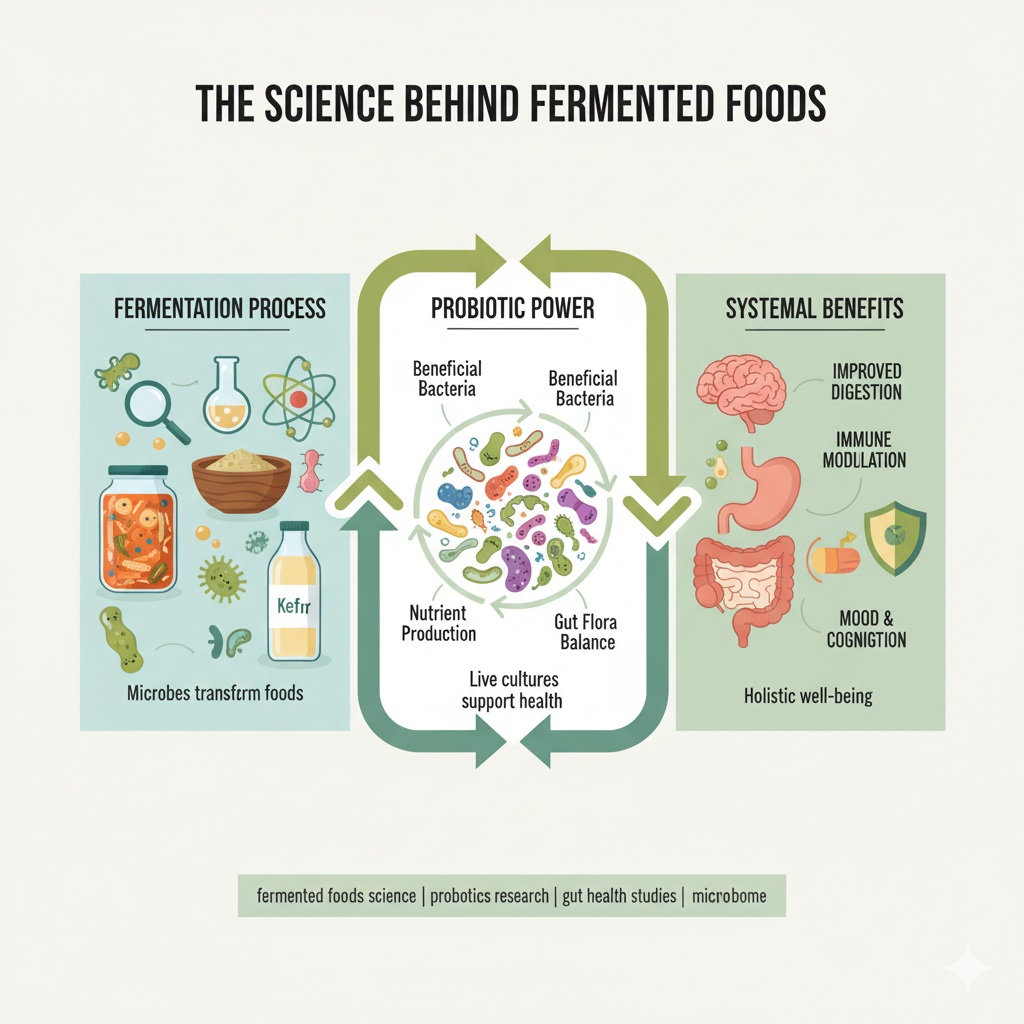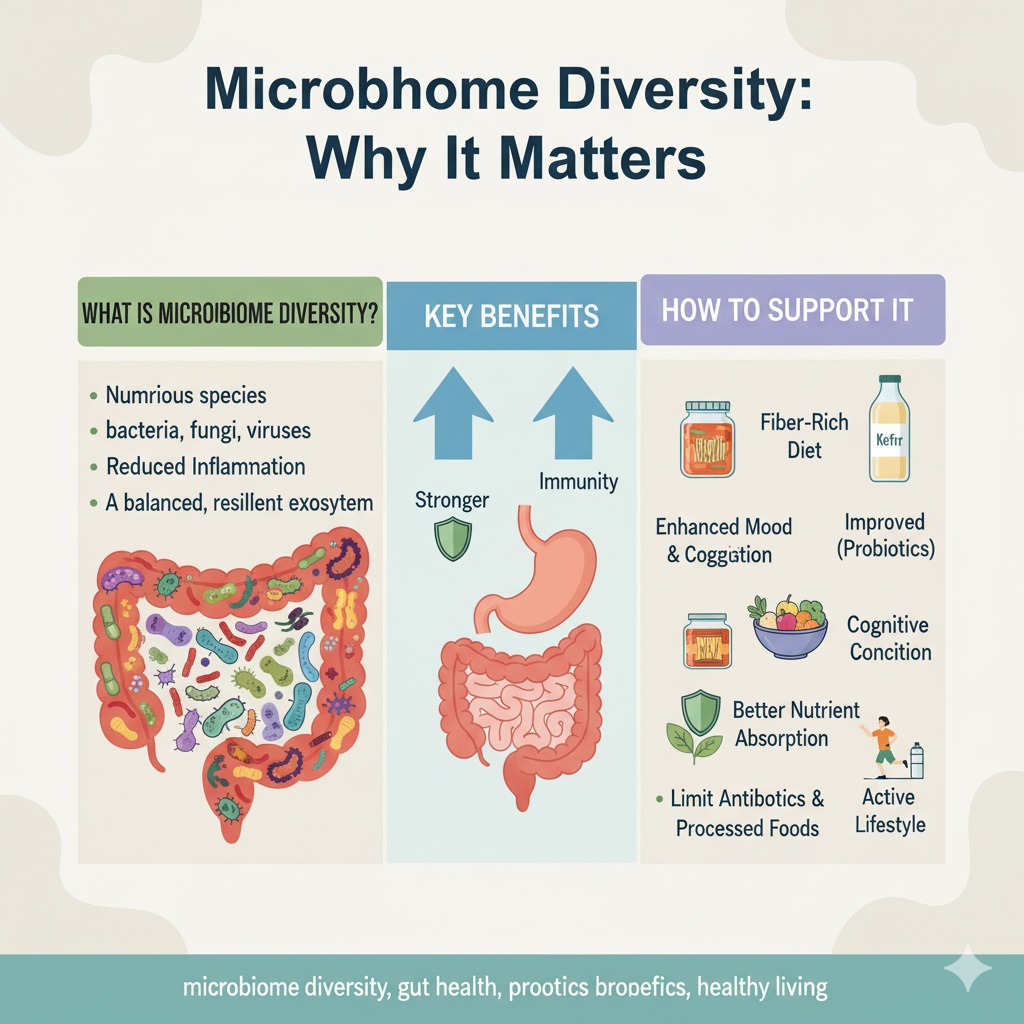Recent probiotics research has revealed that fermented foods like yogurt, kimchi, and kombucha enhance gut microbiome diversity and reduce inflammation. Studies show these foods improve digestion, boost immune response, and may even influence mood through the gut-brain connection. As science continues to uncover their benefits, fermented foods are emerging as a cornerstone of long-term health and natural wellness.
Fermented foods have taken the spotlight in recent years, praised as natural probiotics that can heal the gut, strengthen immunity, and even boost mental health. From ancient traditions like kimchi and kefir to modern kombucha trends, fermentation has always been a part of human culture. But beyond taste and tradition, what does science actually say about these foods?
Let’s dive into the fascinating world of fermented foods science, explore what probiotics research has uncovered, and discover how these time-tested foods contribute to gut health and overall well-being.
1. What Is Fermentation and Why It Matters
Fermentation is one of the oldest food preservation methods in human history. It occurs when microorganisms — such as bacteria, yeast, or fungi — convert carbohydrates (like sugars and starches) into other compounds, such as lactic acid or alcohol.
This process not only extends the shelf life of foods but also transforms their nutritional and sensory properties. Fermented foods often become:
- Easier to digest
- Richer in vitamins and bioactive compounds
- Packed with beneficial microbes (probiotics)
The result is a living food full of health-promoting potential, shaped by centuries of culinary and cultural evolution — now supported by modern scientific studies.
2. A Brief History of Fermented Foods
Fermentation isn’t new — it’s ancient. Archaeological findings show that humans were fermenting beverages and foods over 9,000 years ago. Ancient civilizations across the globe relied on fermentation not just for preservation but also for health and ritual purposes:
- Korea: Kimchi, a staple rich in lactic acid bacteria.
- Japan: Miso and soy sauce made through fungal fermentation.
- Europe: Sauerkraut, yogurt, and cheese — dietary staples since early civilization.
- Africa: Fermented grains and dairy like injera and kefir.
While traditional cultures discovered fermentation by accident, modern scientists now understand its biological mechanisms — and its deep link to gut microbiome health.
3. The Microbiology of Fermentation
At the core of every fermented food lies a complex microbial community. These microbes — mostly lactic acid bacteria (LAB), yeasts, and molds — break down food components, releasing enzymes and nutrients in the process.
Key Players in Fermentation:
- Lactobacillus: Converts sugars into lactic acid; supports gut health.
- Bifidobacterium: Helps balance intestinal flora.
- Saccharomyces cerevisiae: A yeast used in bread and beverages.
- Aspergillus oryzae: The mold behind soy fermentation.
These microorganisms not only produce the signature flavors and textures of fermented foods but also contribute live probiotics that can colonize the gut and influence human health.
4. Fermented Foods and Gut Health: What Studies Reveal
Modern gut health studies have shown that regular consumption of fermented foods can have measurable effects on the human microbiome.
A landmark study from Stanford University (2021) found that individuals who ate a diet rich in fermented foods — including yogurt, kimchi, and kombucha — experienced increased microbial diversity and reduced inflammation markers within just 10 weeks.
Scientific Benefits Observed:
- Improved digestion and nutrient absorption
- Stronger immune response
- Lower chronic inflammation
- Enhanced gut barrier integrity
The evidence suggests that fermentation introduces beneficial bacteria while also producing metabolites (like short-chain fatty acids) that support intestinal and immune health.
5. Probiotics Research: How Fermented Foods Support the Body
Probiotics research continues to uncover how beneficial bacteria from fermented foods interact with the body.
When you eat probiotic-rich foods, these microbes don’t just pass through the digestive system — they communicate with immune cells, influence mood-related hormones, and even help regulate metabolism.
Key Findings from Recent Studies:
- Probiotics can reduce antibiotic-related diarrhea and boost immune resilience.
- Certain strains like Lactobacillus plantarum have anti-inflammatory effects.
- Fermented dairy products like kefir and yogurt are linked to better lactose digestion.
- Some probiotics may help reduce symptoms of anxiety and depression via the gut-brain axis.
However, researchers emphasize that the effects are strain-specific — not all fermented foods offer the same benefits, and individual responses can vary.
6. Nutritional Advantages of Fermentation
Beyond probiotics, fermentation enhances the nutritional quality of foods in several fascinating ways:
- Increased vitamin content: Fermentation boosts levels of B vitamins, folate, and vitamin K2.
- Reduced antinutrients: It breaks down compounds like phytates, improving mineral absorption.
- Enhanced protein digestibility: Especially in fermented soy and dairy products.
- Formation of bioactive peptides: These compounds can lower blood pressure and improve heart health.
This biochemical transformation turns ordinary foods into nutrient-dense superfoods backed by both tradition and modern nutrition science.
7. Popular Fermented Foods and Their Unique Benefits
Let’s look at some of the world’s favorite fermented foods and what makes them special:
| Food | Key Microbes | Main Health Benefits |
|---|---|---|
| Yogurt | Lactobacillus bulgaricus, Streptococcus thermophilus | Supports digestion, immunity, and bone health |
| Kefir | Yeast + bacteria symbiosis | Boosts gut microbiome diversity |
| Kimchi | Lactobacillus plantarum | Anti-inflammatory and antioxidant effects |
| Sauerkraut | Leuconostoc mesenteroides | Enhances vitamin C and immune strength |
| Miso | Aspergillus oryzae | Rich in amino acids and enzymes |
| Kombucha | Yeast and acetic acid bacteria | Detoxifying and energizing properties |
Each has its own microbial signature — and together they offer a vast menu of gut-friendly, immune-supportive foods.
8. How to Add Fermented Foods to Your Diet
Adding fermented foods to your routine doesn’t have to be complicated. Small, consistent servings can make a big impact on gut health.
Practical Tips:
- Start with familiar options like yogurt or pickles.
- Add kimchi or sauerkraut to salads and sandwiches.
- Sip kombucha as a natural alternative to sugary drinks.
- Try miso soup or tempeh in your meals.
- Experiment with DIY fermentation at home — it’s simple and rewarding!
Consistency is key — your gut microbiome thrives on routine exposure to live, beneficial microbes.
9. Future of Fermented Foods Research
The next frontier in fermented foods science lies in precision — understanding which microbes have the strongest effects and how to tailor them for personalized nutrition.
Emerging research focuses on:
- Custom probiotic formulations
- Microbiome-based therapies
- Fermented plant-based alternatives
- Targeted strains for mental health and metabolism
The intersection of food science, microbiology, and medicine could reshape how we view nutrition — not just as sustenance but as microbial medicine.
Conclusion: A Living Legacy of Health
Fermented foods are a perfect blend of tradition and science — an ancient practice now validated by cutting-edge research. These living foods don’t just preserve flavor; they preserve health.
Through probiotics research and gut health studies, we’re learning that the microbes we consume can shape the microbes within us — strengthening immunity, improving digestion, and supporting overall well-being.
So the next time you enjoy a spoonful of yogurt or a bite of kimchi, remember: you’re not just eating food — you’re feeding your microbiome.




